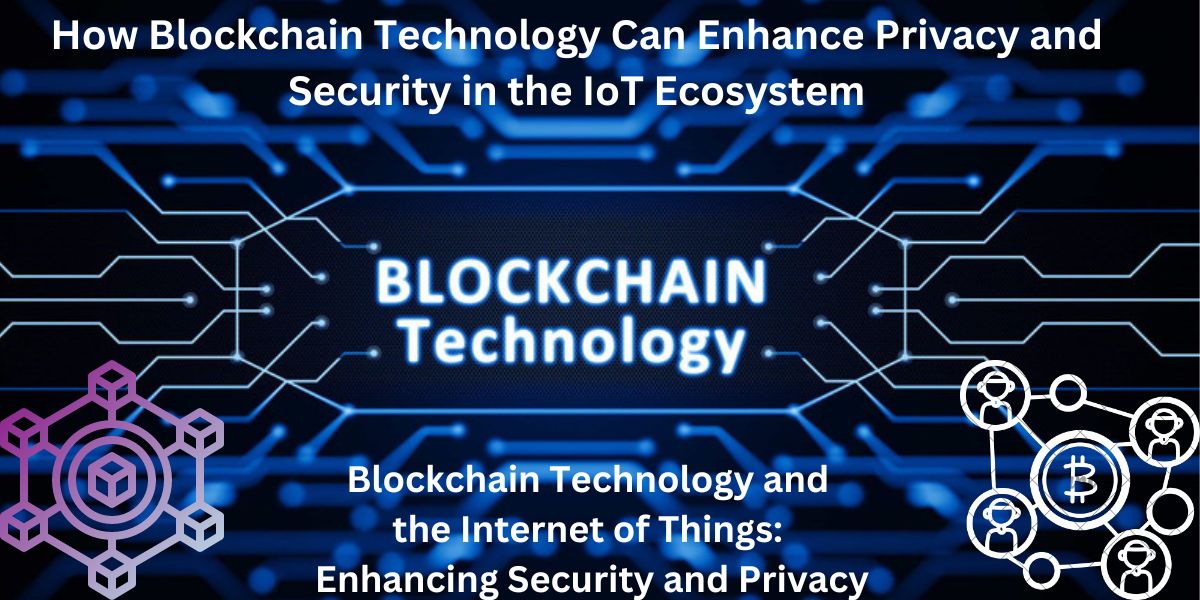The Internet of Things (IoT) has revolutionized the way we interact with technology, enabling interconnected devices to communicate with each other seamlessly. As the IoT continues to expand, concerns over privacy and security have also grown.
According to Statista, there will be 29 billion IoT devices by 2030. By the same year, the global IoT market will be worth $1 billion. The massive amounts of data generated by these connected devices are vulnerable to cyber threats, and any breach can have severe consequences.
In this context, blockchain technology offers a promising solution to enhance privacy and security in the IoT ecosystem. Storing IoT data on blockchain technology provides more security. It makes it more difficult for hackers to get access to networks that handle critical data.
What is Blockchain Technology?
Understanding blockchain can enhance privacy and security in the IoT ecosystem. Blockchain technology is a decentralized virtual ledger that records transactions throughout the networks of computers. It uses cryptography to secure transactions and ensure the integrity of data. The data stored in a blockchain is immutable, meaning that once it is added to the ledger, it cannot be altered or deleted.
These features make blockchain technology ideal for creating a secure and transparent system that can enhance privacy and security in the IoT ecosystem. By integrating blockchain with IoT, it is possible to create a more secure and reliable system that can prevent data breaches and protect the privacy of users.
The Blockchain Security and IoT
Every transaction on the blockchain is double-checked by multiple entities, then recorded in a distributed ledger that is shared across all nodes to avoid conflicts and build confidence among all parties involved in the permissioned network.
The Internet of Things (IoT) and blockchain security work together to enable the autonomous operation of smart devices. The configuration also makes it easier to monitor how devices communicate with one another. Blockchain adoption in IoT can be beneficial in all walks of our lives.
For example, imagine a smart home system that allows homeowners to remotely control their lights, locks, and appliances. This system relies on a network of IoT devices, each of which collects and transmits sensitive data about the home’s occupants and their activities. If this data were to fall into the wrong hands, it could lead to privacy violations or even physical harm.
By implementing blockchain technology, this smart home system could ensure that all data transmissions are secure, tamper-proof, and transparent. Each IoT device could store its data on the blockchain, where it would be verified by a network of nodes and encrypted to prevent unauthorized access. The decentralized nature of the blockchain would make it nearly impossible for a hacker to compromise the entire system, as they would need to breach multiple nodes simultaneously.
Use Cases of IoT-enabled Blockchain Technology
The Internet of Things (IoT) and blockchain technology are two of the most disruptive technologies. Both technologies have the potential to transform the way we interact with the world around us, and together they can create a powerful combination.
Here are some of the top use cases of IoT-enabled blockchain technology:
Supply chain management
The supply chain is a complex network of entities that includes manufacturers, distributors, wholesalers, and retailers. The use of IoT devices can help track products at every stage of the supply chain, from manufacturing to delivery. Blockchain can provide a secure, tamper-proof record of every transaction, ensuring transparency and accountability.
Smart Cities
Cities are becoming increasingly connected, with IoT devices being used to monitor and control everything from traffic to energy usage. Blockchain can provide a secure and decentralized platform for managing data and transactions, making it easier to share information between different stakeholders.
Freight transportation
Freight transportation is challenging and requires cooperation from numerous parties. It is possible to store temperatures, arrival times, and the current status of shipping containers in transit with the help of an IoT-enabled blockchain. The information is reliable, so all parties can act to move the freight quickly and effectively.
Healthcare
IoT devices are being used to monitor patients’ health and provide real-time data to healthcare providers. Blockchain can be used to create a secure and private platform for storing and sharing medical records, ensuring that sensitive information is kept confidential.
Advantages of IoT-Blockchain

As blockchain technology explained, scalability, privacy, and trust in IoT security are all issues that blockchain technology is perfectly suited to address. IoT-Blockchain integration combines the power of two transformative technologies to create new opportunities and benefits. Advantages of IoT-Blockchain are:
- Provides a secure and transparent decentralized network for IoT devices.
- Enables secure and automated data exchange between devices.
- Increases data integrity, authenticity, and privacy.
- Enhances supply chain traceability and transparency.
- Enables decentralized energy and resource management.
- Reduces costs associated with intermediaries and manual processes.
- Increases efficiency and productivity of IoT systems.
- Enables new business models and revenue streams.
- Facilitates seamless integration with other emerging technologies such as AI and 5G.
The benefits of increased security, transparency, and automation in data exchange and management are numerous. These benefits can lead to more efficient and productive IoT systems, as well as new revenue streams and business models.
What are the challenges of blockchain and IoT?
The implementation of blockchain App Development Company in IoT also brings several challenges that need to be addressed for successful deployment. Challenges encountered while implementing blockchain in IoT include:
- Scalability and interoperability issues due to the large volume of IoT devices.
- Limited processing power and memory of IoT devices.
- Security concerns and vulnerabilities in IoT devices.
- High transaction costs and slow transaction processing times.
- Integration challenges with existing legacy systems and protocols.
- The complexity of blockchain technology and lack of skilled professionals.
- Regulatory and legal challenges related to data privacy and ownership.
To overcome these challenges, organizations need to collaborate and invest in research and development. This will enable them to build scalable and interoperable blockchain solutions that can integrate with existing IoT infrastructure. With these efforts, the implementation of blockchain in IoT can be successful and transformative.
Conclusion
Blockchain technology offers a secure, transparent, and decentralized way to enhance privacy and security in the IoT ecosystem. It also enables new opportunities for innovation and growth.
However, there are still some challenges and limitations that need to be addressed, such as scalability, interoperability, and regulatory compliance.
Nonetheless, with continued research and development, blockchain technology can pave the way for a more secure, transparent, and decentralized IoT future.
Read more:
Security of Sensitive Data Monitoring
How to Use AI Technology in Your Business?
Top Biotechnology Trends and Innovations to Look For in 2023 – A Complete Walkthrough












